20+ Best Employer of Record (Canada) Providers of 2026
The best employer of record services in Canada include Deel, Remote, and Remotefirst.








The best Canadian Employer of Record (EOR) simplifies hiring and payroll for employees in Canada. This solution lets you avoid the hassle of setting up a local entity while ensuring your hires are governed by the appropriate provincial laws, even if your team is distributed across multiple provinces.
Drawn from our five years of tracking and reviewing this space, we’ve found that top Canada EOR services combine strong local expertise, transparent pricing, and efficient onboarding. The (vetted) providers featured here offer just that, helping you quickly and compliantly hire talent in Ottawa, Québec, British Columbia, and more.
We’ve reviewed more than 50 EOR companies with active Canadian employment services through a mix of live demos, platform testing, client interviews, and verified user feedback. To identify services that not only meet compliance standards but also deliver a smooth experience for both employers and employees, we prioritized companies with local knowledge of labor laws, service breadth, tenure, customer support, and scalability.
- In-depth understanding of Canadian labor laws: Hiring in Canada requires navigating complex provincial and federal labor laws, including probationary period, sick leave, parental leave, maternity leave, overtime pay, paid time off, statutory holidays, standard working hours, and more. We gave preference to providers with in-house Canadian legal and HR experts, real-time compliance monitoring, and a proven track record of managing employment in multiple provinces.
- Service coverage: We evaluated each EOR’s service breadth, from Canadian payroll and benefits administration to onboarding, offboarding, and HR support. We also assessed how each platform handles integrations with popular HR systems, as well as its overall usability. A top-rated EOR should make it easy to manage your Canadian workforce without technical friction.
- Reputation, experience, and customer support: We thoroughly analyzed user reviews, spoke with clients, and evaluated their time in the Canadian market. We gave preference to EORs that offer dependable customer service, support in both English and French, and dedicated account managers for prompt and accurate help.
- Scalability: Whether you’re hiring one employee or building a full Canadian team, scalability matters. We looked for EORs that offer flexible contract options, support both employees and contractors, and can adjust easily as business needs evolve. Efficient onboarding workflows and adaptable pricing models were key differentiators here.
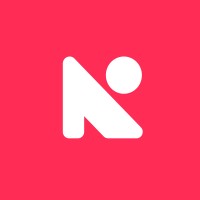
Native Teams

Native Teams stood out in our tests for its low-cost, no-entity-needed EOR solution, with localized payroll in CAD, compliant contract generation, and key deductions built in. Starting at $99 per employee per month, it’s easily one of the most budget-friendly ways to hire Canadian employees legally.
PROS
- Legally compliant hiring in Canada with employment contracts.
- Payroll in CAD, with support for federal and provincial deductions.
- Employee debit card and wallet with 1% cashback.
- Bonus, leave, and expense workflows built in.
- Visa and mobility support (for foreign talent relocating to Canada).
- Good range of EOR services with compliant contracts, payroll, benefits, and visa support.
- Pricing is half the typical EOR rate, and a free trial is offered.
- Built-in wallet and debit card for employees, with 1% cashback on balances.
- Contracts are bilingual and can be partially customized with legal team review.
- Visa and mobility support embedded in-platform for 20+ countries.
- Automated workflows for bonuses, tax allowances, and leave tracking.
CONS
- No integrations with HRIS or finance tools (on 2026 roadmap).
- UI is functional but lacks modern polish.
- Doesn’t include salary benchmarking or market compensation data.
- Entity support is not a fit for enterprise-scale needs.
- User interface lacks polish, and navigation can feel unintuitive.
- Onboarding can be slow, especially when syncing legal documentation.
- No HRIS integrations or open API (planned for 2026).
- Does not offer compensation benchmarking or planning tools.
Native Teams offers a practical, lightweight EOR solution for companies looking to hire full-time employees in Canada without opening a local entity. For $99 per employee per month, the platform handles legal employment setup, Canadian payroll, and core compliance with both federal and provincial tax rules.
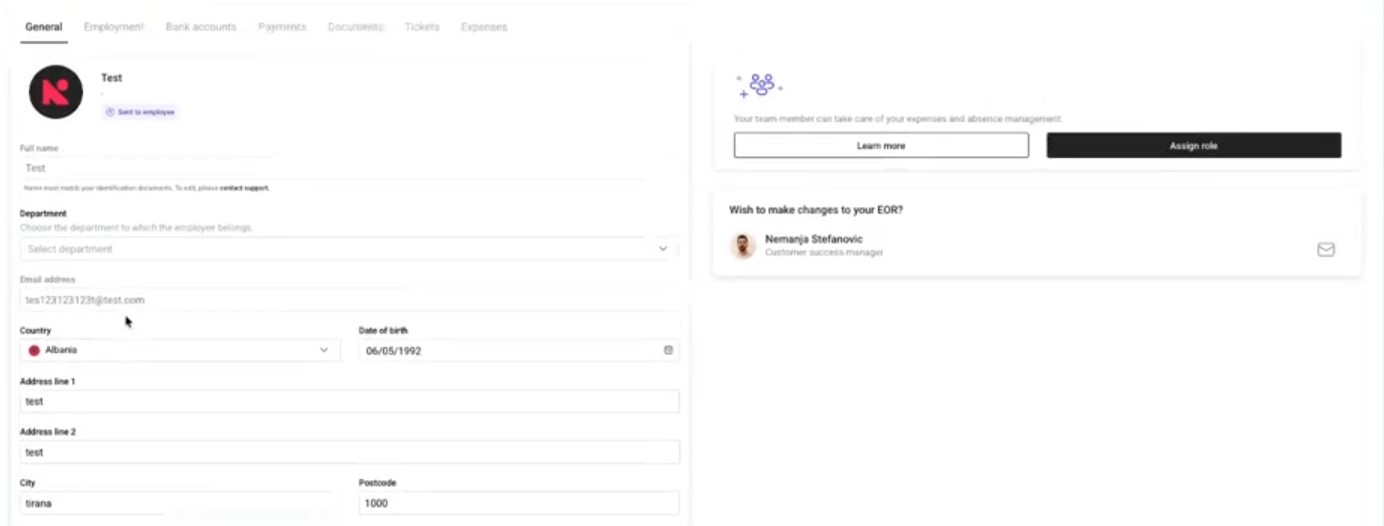
Employment contracts are bilingual (English and French, where applicable) and reviewed by the Native Teams’ legal team. Payroll includes automated processing in Canadian dollars with deductions for CPP, EI, and federal/provincial income tax. The platform also supports vacation tracking in line with Canadian standards.
For day-to-day HR operations, Native Teams includes built-in workflows for bonuses, leave, and employee expenses. These tools are not as advanced or customizable as those offered by higher-end EOR platforms, given the low cost. Essentially, they do cover the fundamentals well. Employers can log bonuses, approve sick leave, or reimburse work-related purchases with a few clicks, each routed to Native Teams’ internal payroll team for processing.
Another cool feature for Canadian hires is the multi-currency wallet and Mastercard, which allows employees to receive pay in CAD or other currencies, use the Native Teams card for purchases, or transfer funds to a personal bank account. Additionally, employees earn 1% monthly cashback on wallet balances, which is not typically seen in EOR platforms.
Mobility support is also available for companies relocating talent into Canada, with visa request handling built into the platform and managed by Native Teams’ internal team.
While its pricing is unmatched, the platform’s interface didn’t really impress us aesthetically; it’s rather basic. And integrations with HRIS or accounting software are not yet live (though confirmed for 2026). Additionally, there’s no built-in compensation benchmarking, which could be a barrier for teams trying to stay competitive in Canada’s tight talent market.
Native Teams has served over 3,000 companies, including Semos Cloud, Mad Head Games, and Kaiko Systems.
Free trial available. Pricing starts at $99/employee/month.





Best For
Native Teams is ideal for international startups and growing companies looking to hire Canadian talent quickly and affordably.

Remote

What sets Remote apart is its ability to power EOR infrastructure behind leading HR platforms like Gusto and BambooHR. Customers can onboard Canadian employees through the system they already use, while Remote handles the legal, tax, and compliance lift in the background.
PROS
- Fully integrates with Gusto, BambooHR, and Personio, removing the necessity for separate platforms.
- Local Canadian entity handles tax filings, remittances, and invoicing.
- Includes ID verification and right-to-work checks as part of onboarding.
- Transparent flat-rate pricing avoids upfront deposits and FX-related billing surprises.
- Dedicated implementation manager and named customer success contact.
- Canadian employees can split salary across bank accounts.
- Security-first infrastructure includes IP Guard to protect company data and IP.
- Fast and compliant payroll in 170+ countries.
- Live chat support with local payroll experts.
- Flexible, localized benefit packages.
- Flat-rate pricing structure, no deposits or hidden fees.
- Mobile app streamlines expense reimbursement with autofill from receipt photos.
CONS
- Premium pricing may be too steep for early-stage startups.
- Background check availability varies by province and job type.
- Some users have reported slower support response times as Remote scales.
- No support for Canadian-specific incentive stock options (if applicable).
- Doesn’t have a free trial.
- Redundant for organizations solely recruiting within the U.S.
- Help center documentation isn’t easiest to understand.
Remote consistently builds up its reputation as a dependable global employment service provider, and Canada EOR reflects that same commitment to security and compliance.
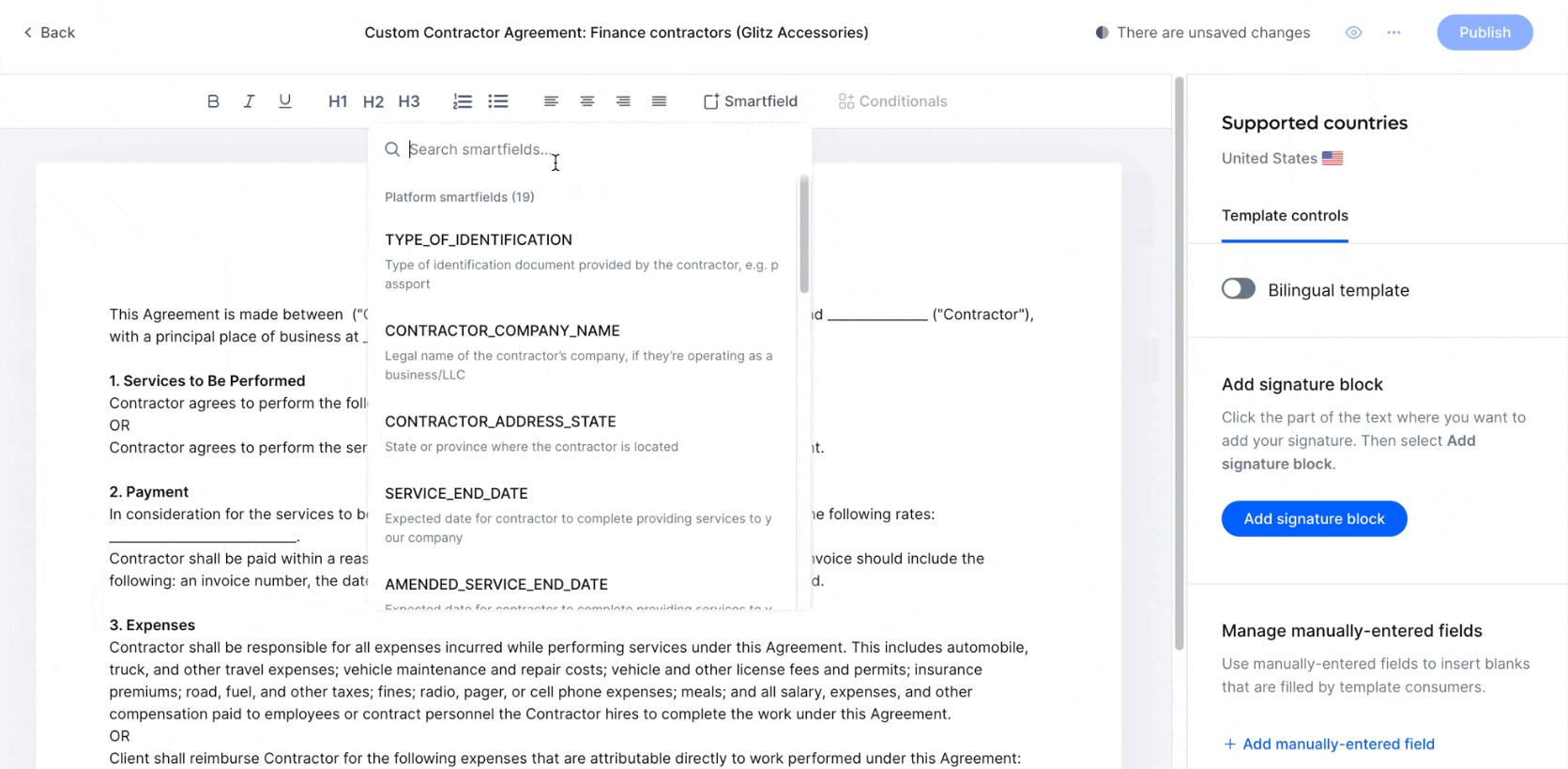
We loved how this vendor helps power Canadian as well as global hiring via its deep integration with big HR platforms like Gusto, BambooHR, and Personio. That means companies can hire employees in Canada right within the HR system they already use, while Remote quietly handles the legal, tax, and payroll complexity behind the scenes.
Additionally, the localized invoicing system is a major advantage. Since Remote bills from its Canadian entity, customers are spared the need to file withholding tax returns or communicate directly with tax authorities, which is a significant relief for smaller teams lacking in-house finance expertise.
The onboarding experience also impressed us. A dedicated implementation manager walks new clients through their first hire, then hands them off to a Customer Success Manager for ongoing support. Identity verification and right-to-work checks are automatically included, and background screening is handled carefully under each jurisdiction’s privacy and employment laws.
One cool feature for SaaS and tech startups we found was IP Guard, which safeguards proprietary code, data, and patents. For companies hiring technical talent abroad, this built-in protection helps ensure critical assets stay secure.
That said, Remote’s pricing starts at $699 per employee per month if billed monthly, placing it firmly in the premium tier. While that may be justifiable for larger or well-funded teams, early-stage startups may find it cost-prohibitive. We also noted a few user reports of delayed support response times as the company scales. And unlike Deel, Remote currently does not support Canadian-specific incentive stock options, which may be a drawback for companies looking to offer tax-advantaged equity in competitive hiring markets.
Toyota, HelloFresh, DoorDash, SoundCloud, Mindvalley.
Remote offers Canada EOR at $599/employee/month (annual billing) or $699/employee/month (monthly billing).
From what we’ve seen, Remote’s latest Canada-specific update focuses on tightening leave management rather than expanding hiring workflows. The introduction of Carryover Fields in contract details gives employers more control over how unused PTO is handled, including setting maximum carryover limits, defining expiration rules, and applying time-based expiry policies.





Best For
Remote is best for mid-sized companies, particularly those using Gusto or BambooHR, that seek compliant, fully integrated Canadian hiring solutions without the hassle of managing local tax or legal filings.
.png)
Deel
.png)
Deel simplifies hiring in Canada with an owned legal entity, built-in benefits, and full compliance with federal and provincial laws. Its ability to onboard Canadian employees in just one day, manage payroll, and support bilingual compliance under Bill 96 makes it one of the best EOR services for companies entering the Canadian market.
PROS
- Operates through a wholly-owned Canadian entity, reducing risk and ensuring compliance.
- Built-in statutory benefit packages including CPP, EI, and provincial health plans.
- Fully compliant with Bill 96: offers contracts and customer support in French.
- Real-time compliance alerts and automated local reporting.
- Transparent, flat-fee pricing model.
- Average onboarding time is just 1 day in Canada.
- Supports optional benefits like pension through Wealthsimple and tiered healthcare via Manulife.
- Excellent 24/7 customer service with fast onboarding (2-3 days) and local payroll experts in each jurisdiction.
- Seamless integration with platforms like QuickBooks, BambooHR, and Greenhouse, plus custom integration options.
- User-friendly, self-service features enable quick setup; identity verification often takes under 24 hours.
- Automated invoices simplify payments, provided they're in English.
CONS
- No free trial or sandbox environment for testing workflows.
- Some users may find customization of employment contracts limited without legal add-ons.
- Benefits options may be less customizable compared to hiring directly through an in-country HR provider.
- Key features like onboarding automation are add-ons, which may increase costs.
- Limited flexibility in modifying contracts or service agreements; changes often require an addendum.
- Invoices cannot be generated in languages other than English.
Deel's Canada EOR service really knows how to impress us. It's fast, keeps everything legal, and wraps all the benefits into one neat package, all managed from a single dashboard. If you're looking to expand into Canada, you can onboard new employees in 24 hours while skipping the headaches of entity setup and management, figuring out provincial payroll rules, and dealing with multi-lingual compliance paperwork.

What impressed us most was Deel’s ability to support both federal regulations (like CPP, EI, and PIPEDA) and provincial nuances such as Quebec’s Bill 96. Deel offers all legal documents and support services in French, which is a major compliance requirement for operating in Quebec and a rare feature among global EOR vendors.
We also appreciated the localized benefits coverage. Deel includes all mandatory Canadian benefits plus options for upgrading health plans through Manulife and adding an employee pension via Wealthsimple. This flexibility gives employers room to tailor offers without building a plan from scratch.
From a user standpoint, the platform’s flat-fee pricing and real-time compliance alerts make it easy to budget and stay ahead of local changes. Unlike providers that rely on local partners or subcontractors, Deel uses its own Canadian entity, ensuring consistent service quality and legal accountability.
While Deel’s platform covers most core EOR needs out of the box, teams looking for extensive contract customization or niche benefit design might find the system more rigid. Still, for most SMBs, the balance between speed, reliability, and compliance makes Deel a top-tier choice for Canadian hiring.
35,000+ companies, including Okara, Fini, Zerve, and Alan.
Deel Canada EOR services begin at $599 per employee per month.
The December 2025 updates primarily focus on improving data accuracy and day-to-day usability. Deel now allows EOR workers to request updates to their personal information directly in the platform, with changes routed through admin approval to maintain compliance controls. The rollout of localized datepicker formats also removes a common source of friction for global teams by aligning date inputs with local conventions. Finally, the new compensation profile centralizes salary, variable pay, and historical changes in one place, giving both employers and EOR employees clearer visibility into total compensation.





Best For
Deel’s Canada EOR is ideal for fast-growing companies based in the U.S. or globally that want to hire full-time Canadian employees without opening a local entity.

Remofirst

We picked RemoFirst for its standout affordability and responsiveness. It delivers compliant Canada EOR services at a fraction of the cost of major providers, making it an attractive fit for startups and SMBs prioritizing budget over feature depth.
PROS
- Flat-rate pricing starts at $199 per employee/month with no hidden fees.
- Onboards Canadian hires quickly, often within 1 to 5 days.
- Strong customer service with clear, responsive communication.
- Supports contract compliance, basic medical coverage, and equipment provisioning.
- Employers are able to pay Remofirst in USD, GBP, EUR, CAD, and SGD.
- In turn, Remofirst pays each global employee in their local currency.
- Over 150 countries serviced
- Since it’s a young product, the UI looks quite modern, sleek, and generally easy on the eye.
CONS
- Relies on local partners rather than owning its own legal entities.
- Dashboard lacks transparency around tasks, assignments, and past payroll.
- Not suited for companies needing deep HRIS integrations or advanced features.
- As a younger company than others in the industry, Remofirst are still rolling out new integrations and features from their roadmap every month. Hence, these are somewhat limited for now.
If you’re hiring in Canada on a startup budget, RemoFirst is easily one of the most cost-effective EOR options we’ve seen. At a flat rate starting at $199 per employee per month, it undercuts most competitors by hundreds of dollars per head. That makes it perfect for early-stage or bootstrapped companies seeking to keep things compliant with Canadian labor laws, taxes, and benefits without breaking the bank.

We found RemoFirst well-equipped for foundational HR needs in Canada. You can draft compliant contracts, run payroll in CAD, manage contractors and employees on one platform, and even provision equipment like laptops or monitors through its RemoTech add-on. Other services like RemoVisa and RemoCheck also help with immigration and background screening, and basic medical coverage is included for most regions via RemoHealth.
Users repeatedly mentioned fast onboarding, with many cases wrapped in just one to five days. Other feedback pointed to excellent communication and customer support, with multiple customers noting that RemoFirst was quick to respond, schedule calls, and resolve questions clearly throughout the process.
That responsiveness helps offset what RemoFirst lacks in platform maturity. The dashboard, for instance, doesn’t yet show historical payroll approvals or offer full transparency into all assignments or organizational relationships. Some users also felt that the onboarding experience for points of contact could be better structured, especially for clients new to global employment.
However, unlike providers such as Deel or G-P, RemoFirst doesn’t own its entities. It relies on local partners to deliver services in Canada and beyond. That model helps keep costs down but may introduce more variability in execution depending on the country.
All told, RemoFirst isn’t trying to compete with enterprise-grade platforms on depth. But for startups or small companies looking to compliantly hire Canadian talent without blowing through their budget, it’s a practical and increasingly popular option.
BCG, PandaDocs, DSM, Kota, inDrive
RemoFirst offers Canada EOR rates from $199 per employee/month.
From what we observed in RemoFirst’s latest product updates (December 2025), the focus is firmly on payroll reliability and funding workflows rather than headline-grabbing features. Auto-generated timesheets now include locked pay periods, which prevent employees from accidentally altering dates and reduce mismatches between timesheets and payroll, especially for US payroll runs. RemoFirst also adjusted its timesheet reminder logic, adding an earlier notification to improve on-time submissions around payroll cutoffs. On the payments side, the platform expanded direct debit funding via GoCardless, supporting multiple currencies including USD, GBP, EUR, and CAD.





Best For
RemoFirst works best for startups and small businesses that need to hire in Canada for remote work and want an affordable, fast-moving EOR partner.

We used Remofirst for all HR and compliance functions. These included running background checks, processing work permits and visas, maintaining employee records, and managing payroll.
Our small HR team of five people relied on the platform daily. Thanks to the platform’s features, the onboarding process became much more efficient. Remofirst provided a streamlined approach to workforce management, simplifying the employee lifecycle.
- The platform is straightforward and user-friendly for everyone.
- Since it is designed for global use, it allowed for more seamless integrations, particularly with payroll.
- The platform offers different pricing plans, providing flexibility for teams of various sizes.
With one of my previous employers, I personally used Remofirst for one year. We implemented the platform during a transition period when we went fully remote and began hiring globally. We used Remofirst for employee records, background checks, payroll, and tracking work permits.
The organization needed a short-term solution due to the quick turnaround required. To this day, the company continues to use the platform, and my former colleagues have not reported any issues with it.
- The platform does not offer add-on services, meaning users are limited to its existing features.
- It did not evolve over time to address client requests or feedback.
Yes, I have used similar tools. While Remofirst is good, it is not great. Its lack of evolution forces clients to work within the constraints of its existing features without expecting improvements or updates.
I would advise potential buyers to ensure this platform meets their needs. Remofirst is better suited for smaller companies that do not require advanced or highly adaptable HR software. Organizations should consider whether they need a solution that can grow and evolve alongside their requirements.
It has not evolved over time, which is one of my main criticisms as a former user.
It is ideal for small companies without overly complex HR needs or highly specialized teams that require significant flexibility.
Remofirst would not suit large organizations with extensive HR requirements or those needing a platform that frequently adapts to their evolving needs.
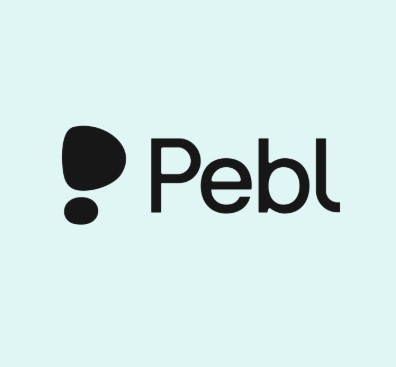
Pebl

Pebl brings over a decade of EOR experience and has proven it can move quickly, especially in time-sensitive hires. It’s not trying to be an all-in-one HR platform, but for companies prioritizing fast, affordable Canadian hiring, Pebl consistently hits the mark.
PROS
- Competitive flat-rate pricing at $399/month.
- Strong service and support during relocation or contractor conversion.
- Handles payroll, benefits, and compliance locally.
- Includes visa and work permit assistance.
- Competitive flat-rate pricing at $399/month.
- Strong service and support during relocation or contractor conversion.
- Handles payroll, benefits, and compliance locally.
- Includes visa and work permit assistance.
CONS
- Limited integration options compared to some other EOR platforms.
- Occasional bugs in the user dashboard.
- Some redundant steps in the onboarding process.
- Limited integration options compared to some other EOR platforms.
- Occasional bugs in the user dashboard.
- Some redundant steps in the onboarding process.
Pebl isn’t the most recognizable name in the EOR space, but its Canada solution stands out for companies that need fast, compliant hiring without overpaying. Founded in 2014, it brings more maturity than newer providers like Deel or RemoteFirst, and focuses heavily on helping U.S. businesses retain or relocate employees north of the border.

In our research, Pebl’s value became clear through real-world use cases. When a critical team member at MercuryGate needed to relocate to Canada, Pebl helped them complete onboarding in under a week with payroll, benefits, and compliance handled locally. That kind of responsiveness is what EORs are built for, and it’s something Pebl consistently delivers on.
At $399 per employee per month, Pebl also comes in well below the $500 - $699 price point typical of competitors, without sacrificing compliance standards. The platform handles employment contracts, payroll, benefits, and ongoing support, including visa and work permit processing when needed. Users noted helpful in-country expertise and praised customer service for being quick and communicative during onboarding.
That said, the user experience isn’t perfect. Some EOR employees reported bugs in the dashboard that made data entry frustrating, and the onboarding process involves repeating some steps. Pebl also lacks deeper integrations or IT/HR add-ons found in more full-featured platforms like Rippling.
MercuryGate, Dragonfly, Hello Yellow
Pebl’s Canada EOR service starts at $399 per employee per month.





Best For
Pebl is best for companies looking for a mid-priced Canada EOR to retain or relocate employees quickly without setting up an entity.
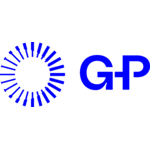
G-P

G-P stands out for its longevity in the EOR space, having operated for over a decade with a consistent focus on legal compliance in global employment. We also found the development of G-P Gia, an AI agent trained on real-world compliance scenarios, to be a strong step forward in automating and scaling risk management for international teams.
PROS
- A highly experienced EOR provider with over a decade of experience in global compliance.
- G-P Gia helps spot compliance risks and saves time on contract reviews.
- Reliable, responsive support with localized benefits guidance.
- Clean, intuitive interface that doesn’t require much training.
- Their G-P Meridian platform is heavily focused on the EOR space, but it’s offered in several plans that can cater to varying needs, even those that might only need to hire people as contractors.
- Using their tool also implies access to a team of HR and legal professionals with significant experience in each country they operate in.
- Their UX has evolved continuously and gotten more intuitive and modern each time we delve into the product.
CONS
- Pure EOR platforms offer limited to no HRIS, performance, or IT tools.
- Limited reporting customization and integration flexibility.
- Per-country fee structure adds cost as you scale globally.
- Customizing a contract is only possible with the G-P Meridian Prime plan.
- Features like background checks, equity management, and IT equipment— to name a few— are only available as add-ons.
- There is no way to try out the software product unless you sign up for a demo and request a proposal.
We’ve reviewed a lot of EOR platforms, and what sets G-P apart in the Canadian market is its longevity and singular focus on compliance. Founded in 2012, G-P helped define the category and still operates with one of the largest in-country expert networks. When it comes to navigating Canada’s mix of provincial laws, payroll structures, and required benefits, that depth of experience matters.
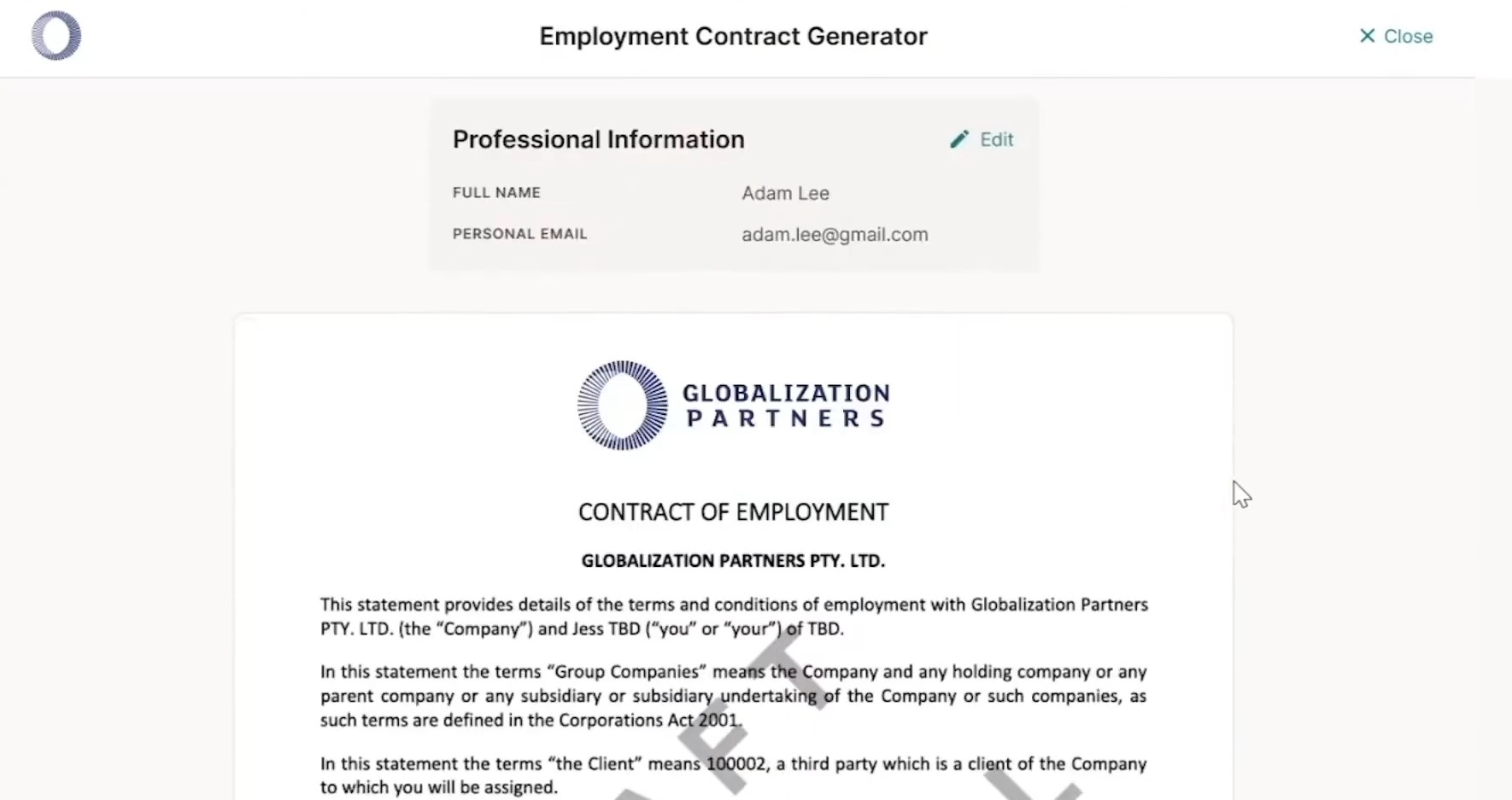
In our research and user interviews, the platform was consistently praised for its ability to simplify onboarding, payroll, and benefits for international employees. Teams with limited internal human resources capacity found G-P particularly helpful when managing a small number of remote workers in countries like Canada, where local employment laws can be complex and vary by province.
We were particularly intrigued by G-P Gia, the company’s AI compliance assistant. Gia is trained on a huge number of real-world legal scenarios and can review contracts for missing clauses, flag compliance risks, and give country-specific guidance. It doesn’t and shouldn’t replace your legal team, but it can save you from unnecessary calls to outside counsel.
Support was another consistent positive in user feedback. Users told us the platform is clean and easy to use, but when questions do come up, the customer success team is fast and knowledgeable. We also liked that support is localized, which makes a real difference in a place like Canada, where employment rules shift depending on the province.
One limitation, however, is that G-P does not offer bundled HRIS or IT management tools and focuses almost entirely on EOR and compliance. Compared to tech-driven global payroll and HR solutions like Deel and Remote, this vendor’s integration partners are also not as extensive.
Regarding pricing, it’s only available after the sales demo, which we understand can be a bit frustrating. Several users also mentioned that it feels expensive, especially when hiring across multiple countries. Additionally, some expressed a desire for more advanced customization options in reporting.
Canidium, Herb Pharm, LivsMed, Black Duck
Pricing is customized, with an estimated cost of approximately $699 per employee per month, according to our sources.
From what we can tell based on G-P’s December 2025 update, this was not an incremental release but a structural rebuild of its EOR product. The company re-architected its platform around a new Global Compliance Engine, aiming to remove a long-standing tradeoff in EOR between speed and compliance. The most visible changes include near-instant employment contract generation across 180+ countries (including Canada), a self-service portal for global employees to manage onboarding and benefits without support tickets, and the launch of G-P Assist, an AI-native support agent designed to answer complex HR questions and take action proactively. Under the hood, G-P is positioning compliance data as digitized, continuously updated, and validated through a mix of automation and in-country legal experts.





Best For
G-P Canada EOR is best suited for businesses prioritizing compliance and long-term stability over bundled HR features.

The primary use was payroll. We added the employee to the system under G-P legal entity in Canada, dictated how often they'd be paid and what their salary was, and G-P handled the rest, including benefit offerings. We also used the platform to process bonus payments, as we have a yearly bonus that is paid to all employees. Although G-P does offer other services, such as background checks, integrations, and reports, we did not use those features.

The breakdown of costs is easy to understand, as the pay slip provides the cost of wages, social fees and taxes, and the management fee. It is easy to add new employees to the solution, as the onboarding process is straightforward. The widespread coverage of G-P is very good, as they cover many countries, making setup easy.
We had a key member of our staff relocate to Canada, where we did not have a legal entity set up to pay them. We needed to continue to payroll this employee, provide benefits, and comply with Canadian employment laws. G-P was able to do this on our behalf for a reasonable price, and we did not have to manually process any payroll. They handled engaging our employee, paying them directly, and addressing any disputes raised by the employee or the government. We used them for just over a year.
Payroll is cumbersome, and there is no clear way to learn how to do it without trial and error. Adding something as simple as a bonus was unclear. Customer service is slow and unprofessional. Without a phone line, emergency situations are not resolved quickly, and their answers to questions are short and incomplete. The website is also hard to navigate, as you lose the navigation panel whenever you go into a module.
G-P is similar to other global payroll/HCM systems but is more cumbersome than the competition. The price isn't better to warrant this lack of intuitiveness either. They recently added a direct Advisor feature, which is very nice, but other competitors have had this feature for some time.
If you are doing business outside of your home country, you need to invest in an EOR/HCM system that is responsive and easy to navigate. It's hard enough to learn each country and their payroll/compliance laws. The partner you pick needs to be engaging and responsive. G-P is on the lower end of the responsiveness scale. I suggest increasing your budget for an EOR tool because of this, as cheaper is not always better.
Yes, they recently added an Advisor feature that will help streamline client issues moving forward.
It is suitable for businesses and HR admins that need to expand to other countries where they do not have a legal entity. Outside of that, G-P is not better than any other HCM service.
If you are looking for a payroll solution or an HCM solution to support your legal entity in a country you operate in, there are far better options than G-P.

Syndesus

We chose Syndesus because it’s one of the few Canada-based EOR providers offering deeply localized service. For U.S. companies hiring across the border, that in-country presence and familiarity with Canadian employment law can make onboarding smoother and compliance more confident, particularly when the tech features aren’t the top priority.
PROS
- Based in Canada with in-country HR and legal expertise.
- Full EOR lifecycle support including compliance training, benefits, and terminations.
- Optional HR advisory and recruiting services provide deeper guidance.
- Ideal for U.S. companies converting contractors or doing initial Canadian hires.
- Based in Canada with in-country HR and legal expertise.
- Full EOR lifecycle support including compliance training, benefits, and terminations.
- Optional HR advisory and recruiting services provide deeper guidance.
- Ideal for U.S. companies converting contractors or doing initial Canadian hires.
CONS
- Dated interface and no direct API integrations.
- Onboarding takes longer than average (30-45 days).
- Pricing not publicly disclosed and platform is light on automation.
- Dated interface and no direct API integrations.
- Onboarding takes longer than average (30-45 days).
- Pricing not publicly disclosed and platform is light on automation.
Syndesus positions itself as a people-first EOR for U.S. companies expanding into Canada. Headquartered in Toronto and operating since 2014, it offers a service-led model that emphasizes local expertise. Unlike tech-first platforms such as Deel or Rippling, Syndesus is lighter on automation and integrations, but for teams seeking a more traditional, hands-on approach, that’s part of the appeal.
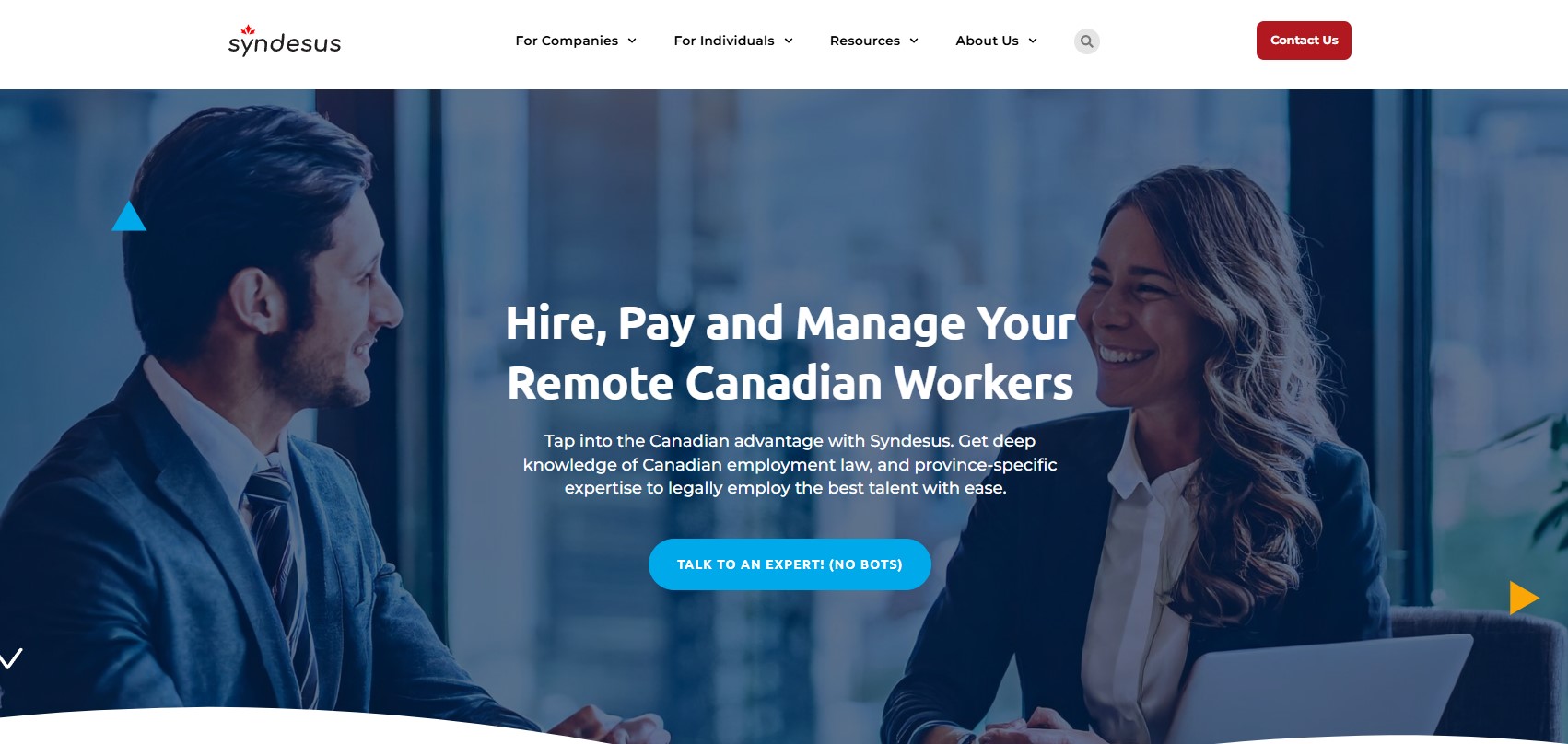
The service scope is comprehensive. Syndesus handles employment contracts, payroll, compliance training, employee check-ins, and terminations. HR compliance is central to their model, with the company assuming employment liability and offering optional advisory support for more complex HR questions like hiring, performance management, or offboarding.
We were especially impressed by their employee-facing support. Onboarding is led by humans, not just checklists, and employees receive active guidance on benefits and workers’ compensation, which are areas many EORs tend to leave to portals or self-service.
Of course, the trade-off is in technology. The platform’s UI is basic and not especially modern, and there are no direct API integrations with popular HR tools. Processes can be manual, and onboarding timelines are longer than average, sometimes taking 30 to 45 days, depending on complexity.
Pricing is custom to each client and includes a one-time setup fee, with volume discounts available for multiple hires. While not necessarily cheaper than tech-focused competitors, users generally found the value aligned with the level of hands-on support.
Datasembly, Nico Work, Chefman.
Customized per company. Includes a one-time setup fee, per-employee monthly cost, and volume discounts for multiple hires.





Best For
Syndesus is best for U.S. companies expanding into Canada that want a Canadian EOR partner with local expertise.
Rippling
If you're planning to hire in Canada and you're tired of juggling disjointed tools for HR, payroll, IT, and compliance, Rippling offers a clean, centralized system that actually talks to itself. It’s not the cheapest option on the market, but the time you save may well justify the spend.
PROS
- Local legal entity in Canada with built-in payroll, HR and compliance.
- HRIS includes policy controls, custom workflows, and robust document handling.
- Reporting pulls in workforce, payroll, and expense data without manual exports.
- Add-on tools like LMS, time tracking, and performance are natively supported.
- Fast support with average response time of six minutes.
- Over 600 integrations with third-party software tools.
- All-in-one platform for employee management + PEO services offered, and even a suite of other IT products
- With 500 integrations, it’s very likely that they integrate with other key tools from your tech stack.
- Operates globally with any currency
- Workflow automation
- Analytics opportunities
- Provides a holistic view of company outflows—headcount costs included
CONS
- Pricing is not publicly listed and is likely on the premium side.
- Software-first design may require more upfront learning for traditional HR teams.
- Benefits ecosystem in Canada is not as developed as with longer-established players.
- Global EOR coverage is smaller than some competitors like Remote or Deel.
- Total buy-in to Rippling is essential
- Very SMB-oriented, in case you’re a larger company.
- New features tend to be buggy in ways that tech teams are not accustomed to fixing
What impressed us most about Rippling’s Canada EOR is how it fits naturally into the rest of the platform. In other words, no need for bouncing between a separate EOR tool and your day-to-day HR dashboard. The moment you adjust a salary or edit a time-off policy, those changes cascade automatically into payroll, contracts, and compliance logs. It’s the kind of system where small operational efficiencies start to really add up.

The built-in reporting is also quite impressive. We were able to pull granular data on headcount, compensation, and equity across our entire team, including Canada. If you’re gearing up for a board meeting or workforce planning across markets, having that level of visibility without manual exports can be a huge plus.
Support is fast and knowledgeable. Rippling claims a median response time of around six minutes, and we found that to be pretty accurate. Complex questions, like how to handle a termination under Canadian labor law, were resolved in just a couple of days, shared multiple users we’ve talked to.
That said, it’s worth noting that Rippling isn't designed to be a hand-holding service provider. Instead, it gives you the tools to control more of the process yourself, which is great if you like visibility and less so if you just want to send a ticket and forget it. The benefits offering also feels lighter than what you’d get with vendors like Remote or G-P, especially if you need deep local coverage.
As for pricing, Rippling doesn’t publish rates for Canada EOR specifically, but based on our research, it can start around $500 per employee per month. If you're using the broader HR or IT features, that pricing can make a lot of sense. If you're just looking for bare-bones compliance, however, it might feel steep.
Flawless, Aalo Atomics, High Speed Training, Northflank
According to our source, Rippling Canada EOR pricing starts at $500/employee/month.
From what we’ve seen in the November 2025 release–the most recent update, Rippling is tightening the screws on provincial payroll accuracy in Canada. The latest update makes it easier to report, override, and retroactively correct an employee’s Province of Employment, a detail that often causes downstream tax issues for distributed teams. The EOR service provider also expanded Employer Health Tax reporting with additional data fields and reporting recipes, and added year-end filing validations to flag potential issues earlier.





Best For
Rippling Canada EOR suits companies needing a single platform for HR, IT, and payroll while expanding in Canada. The platform’s global HR and payroll also make it a great choice for paying employees worldwide.

Our organization uses Rippling to manage various HR processes, including payroll, time-off, benefits administration, employee data management, reporting, and leave management. We are also considering the performance management and survey modules but have not yet decided to implement them. As we grow, Rippling has been proactive in suggesting further process automation. We appreciate the flexibility to activate modules as needed, which prevents us from being overwhelmed by unnecessary complexity.

Rippling's user interface is exceptionally user-friendly, with appealing graphics and straightforward instructions, which differentiates it from other more complex HRIS systems. Our employees find it easy to navigate and locate what they need. The modular approach of Rippling, allowing us to activate features as needed, is highly beneficial. Additionally, Rippling's customer service has proven to be responsive and thorough.
Our organization was grappling with highly manual HR processes such as payroll, benefits administration, timekeeping, and time-off requests, which were prone to errors due to being handled via Excel spreadsheets. As our organization continued to grow rapidly, we required a tool that could automate these processes in a user-friendly manner with minimal implementation time. We have been using Rippling for almost two years now.
We find ourselves renegotiating the cost of our contract annually, with sales representatives often pushing for us to add new features instead of facing a price increase. While custom workflows are beneficial, they can be challenging to set up without a clear understanding of the functionality. The payroll function's inability to handle retroactive pay is a significant drawback, requiring manual calculations on our part.
Rippling stands out due to its ease of use and engaging user interface, which makes it more appealing to employees compared to other HRIS systems I've encountered, which often appear sterile and are not intuitive.
When choosing an HRIS, consider both your current needs and future growth. Be wary of systems that might become obsolete as your business evolves or require additional purchases to meet new needs. It’s also crucial to consider the system's cost structure, especially if your organization experiences high turnover or expects significant growth. Lastly, evaluate how user-friendly and engaging the system is for your employees, as a difficult or dull interface might deter them from using it effectively.
Rippling actively responds to customer feedback, making regular recommendations for system upgrades or new modules based on our specific needs. They have significantly improved their Applicant Tracking System (ATS) by incorporating suggestions from users like us during their annual updates.
Rippling is particularly well-suited for small to medium-sized organizations looking to automate their HR processes comprehensively. It's easy to implement, requiring only a small team, and manageable even by a modest HR department.
Rippling may not be the best fit for government contractors, as it lacks certain functionalities required to ensure compliance with specific contract requirements. Organizations in this sector might find other HRIS systems more tailored to their needs.
Why You Should Trust Us
This guide was written and reviewed by Anh Nguyen, a senior researcher at SelectSoftware Reviews (SSR). Anh specializes in HR technology and global employment, drawing on years of hands-on experience analyzing platforms that help companies scale internationally. Her work has guided thousands of HR and People Operations leaders through vendor selection for recruiting platforms, talent sourcing tech, payroll services, and EORs.
At SSR, every recommendation is based on independent research and firsthand testing. Like any other software category we’ve covered, we vetted each employer of record company in Canada using a structured, transparent assessment methodology that prioritizes real-world performance over marketing claims. While we may earn affiliate commissions when you sign up through our links, this never affects our rankings or recommendations.
You can learn more about how we stay transparent or read more about Anh’s background and expertise here. If you’ve used an EOR in Canada that you think deserves to be featured, tell us about it here.
Canada EOR Trends and Developments
Looking across recent updates we’ve reviewed, the Canadian employer of record market is shifting toward payroll accuracy, employee self-service with guardrails, and earlier detection of compliance issues.
- Greater focus on provincial payroll accuracy: Canadian EOR complexity lives at the provincial level, and vendors are investing more heavily in tooling to manage it correctly. For example, Rippling added the ability to report, override, and retroactively correct an employee’s Province of Employment, along with expanded Employer Health Tax reporting and early year-end validations. These changes reduce downstream corrections and lower the risk of CRA issues tied to misclassified provincial employment.
- More structured leave and contract management: Leave compliance is another area where EORs are tightening controls, particularly around accruals and carryover rules that vary by jurisdiction. Remote, for instance, introduced Carryover Fields for contracts, allowing Canadian employers to define maximum carryover amounts, expiration rules, and expiry timelines for unused PTO. This reflects a broader move toward embedding compliance logic directly into contracts instead of tracking it externally.
- Employee self-service with compliance guardrails: EORs are increasingly letting workers handle routine updates themselves, while keeping employers in control of what gets approved. Examples include Deel, which now allows EOR workers to request personal data changes directly in the platform with admin approval, and G-P, which launched a full self-service portal to reduce reliance on ticket-based support for everyday actions.
- Earlier detection of payroll and compliance issues: Rather than fixing errors at filing time, vendors are building checks earlier into payroll and reporting workflows. Rippling recently added validations designed to catch tax issues before year-end, while G-P re-architected its platform around a Global Compliance Engine that validates actions against up-to-date labor rules before they are finalized.
- Tighter alignment between timesheets and payroll: For EORs supporting hourly or time-based work, payroll reliability depends on clean timesheet data. This helps explain why RemoFirst introduced locked pay periods for auto-generated timesheets and improved reminder logic to reduce missed submissions and payroll delays.
- Increased transparency into compensation: Clear visibility into pay is becoming a baseline expectation for EOR employees and employers alike. Deel’s recent launch of a centralized compensation profile that shows current pay, historical changes, and variable components in one place supports better audits, fewer disputes, and clearer communication for Canadian EOR employees.
Other Canada EOR Services Worth Considering
- Multiplier: Office in Victoria, price starts at $400 per EOR hire/month
- Borderless AI: EOR with country coverage in Canada and free AI HR Agents on all plans
- Oyster: Premium Canada EOR provider, great discounts for nonprofits and startups
- Remote People: Covers all the Canada EOR basics at just $199/month per employee
- Boundless: Great customer support, price starts at $685/month per employee
- Safeguard Global: Over 15 years in the EOR space, recruiting services available
- Papaya Global: Enterprise-grade Canada EOR services, no deposit needed
- G-P: AI-powered Canada EOR provider with over a decade of experience
- Skuad: Priced at $199/month per employee, good for hiring in Canada and APAC
- Justworks: User-friendly employer of record designed with small businesses in mind
- Leap29: Ideal for teams expanding into Ontario, Canada, priced at $300/month per employee
- BridgewaterTI: Specialized in helping U.S. companies hire and pay Canadian talent
- Atlas: Direct Canada employer of record, pricing starts at $599/month per employee
Key Benefits and Risks of Using an EOR in Canada
Partnering with an EOR in Canada helps companies expand or hire locally in a cost-effective, compliant, and less risky manner, without the complexity of establishing a Canadian entity.
- Streamlined hiring: Hiring and onboarding Canadian employees can be complex and time-consuming, and a trustworthy Canada EOR partner can handle these legal requirements in a matter of days. With automated onboarding workflows, a compliant contract generator, and integrated payroll and benefits, they cut down administrative workload and allow your EOR employees to get hired and paid efficiently and compliantly.
- Legal risk reduction: Navigating Canada’s mix of federal and provincial employment laws can be really daunting, especially when you’re a non-resident team. Canada EORs take on this challenge for you by handling legal obligations like tax withholdings, employment contracts, public holidays, overtime pay, and more on your behalf. Oftentimes, these services also provide dedicated legal and HR teams to help you ensure proper worker classification, avoid penalties, and keep policies aligned with the latest labor law changes.
- Cost savings: Instead of spending on legal setup, payroll infrastructure, and ongoing entity management in Canada, you can pay Canada EORs a flat monthly fee to hire employees in the country, which is typically more cost-saving. Recent EOR statistics indicate that 63% of organizations use employer of record services to reduce the financial burden of establishing and managing local entities.
- Access to local expertise: Top Canada EORs employ local specialists who understand the nuances of Canadian labor markets, tax systems, and cultural norms. Their bilingual (English/French) teams ensure all your employment documents and communications meet regional standards, and they provide needed insights into employee benefits expectations and provincial differences that affect hiring and retention.
- Administrative relief: By outsourcing payroll, benefits administration, taxes, and HR documentation to an EOR in Canada, your team has the resource and attention to channel toward business growth, operations, and strategy.
Hiring employees in Canada through an employer of record company does come with some inherent risks, primarily stemming from choosing an unreliable provider. These risks include potential payroll errors, worker misclassification, or inadequate data security. To mitigate this, always ensure your EOR has local legal expertise, deep knowledge of provincial regulations, and fully transparent pricing before committing to a contract.
For more benefits of using an EOR, check out our full post which highlights key use cases.
Who a Canada EOR Is and Isn’t for
An EOR in Canada is best for global teams that want to hire Canadian employees quickly and compliantly. It’s also ideal for remote-first organizations or startups testing the Canadian market before establishing a local subsidiary.
An Employer of Record can make hiring in Canada remarkably simple. It lets you bring employees on board quickly, handle payroll and taxes correctly, and stay compliant with federal and provincial labor laws without setting up a legal entity. For companies that want to hire fast or test the Canadian market, an EOR can be an efficient and low-risk option.
All of that sounds appealing, right? And for many teams, it is. But the truth is that not every organization needs a Canada employer of record. If your company considers registering an entity in Canada, you may be better served by a Professional Employer Organization (PEO). A PEO acts as a co-employer, managing HR administration and payroll while you retain legal responsibility for compliance. It’s a good fit for businesses that want extra HR support but don’t need a third party to act as the legal employer.
The choice becomes even more nuanced if you’re planning a long-term expansion. Setting up a local legal entity takes more time and effort, but it also provides complete control over employment policies, payroll systems, and benefits. It can be more cost-effective in the long run for organizations building a permanent presence with multiple employees.
There are also cases where an EOR might be overkill. For example, if you’re hiring independent contractors in Canada for short-term projects, you don’t need a Canada EOR company to manage compliance. However, if those contractors transition into full-time roles and you want to offer the same benefits as a local employer, such a company can make that process smoother and safer.
Additionally, your EOR partner will be the one who owns the legal employment relationship. Thus, if you’re looking for complete control and flexibility over employment terms, this option might not be the best fit.
Interested in learning more about the employment models we just discussed? Here are some resources you might enjoy:
Canada Employer of Record Key Services
Top employer of record services in Canada manage employment contracts, ensure proper worker classification, process timesheets, and maintain full compliance with Canadian federal and provincial labor laws. Many also offer additional services, such as background checks, immigration support, and contractor-to-employee transitions, to simplify workforce management for international HR.
More specifically, essential functions every reliable Canada EOR should deliver include:
- Compliant onboarding: Preparing offer letters, employment contracts, and policy documentation aligned with local labor laws.
- Payroll processing and funding: Ensuring that the EOR provider pays employees accurately, on time, and ideally in their preferred cycle (typically biweekly or semi-monthly) across provinces.
- Tax filing and remittance: Handling all statutory deductions, filings, and employer contributions.
- Timesheet and leave management: Tracking attendance, vacation, and other leave requests in compliance with local standards.
- Employment contracts and relations: Maintaining compliant agreements and addressing workplace issues or grievances.
- Benefits administration: Managing statutory and optional employee benefits such as health insurance, pensions, and allowances.
- Offboarding and terminations: Managing employee exits in accordance with provincial labor laws and severance requirements.
Additionally, some providers often include advanced capabilities, often around compliance and efficiency, such as:
- Background check services to verify new hires’ credentials.
- Work visa and immigration support for relocating global employees.
- Contractor-to-employee transitions to maintain compliance as teams scale.
- Workers’ compensation management and benefits insurance to ensure full coverage.
- Talent acquisition support for sourcing top talent within Canada and abroad.
How to Choose the Best EOR in Canada
To find the right Canada EOR partner, make sure you know your recruitment needs well enough, research their expertise in Canadian labor laws and tax compliance, and, just as importantly, assess their technology, pricing, support, and data security. Here is a checklist of questions that will come in handy as you shortlist vendors:
Costs and Pricing
Pricing for EOR services in Canada typically ranges from $200 to $700 USD per employee per month, depending on several factors. The common ones that can influence how much you’ll pay include:
- Team size: The more EOR employees you have, the better the chance of getting volume discounts.
- Service level: Premium plans are more expensive, but they come with much better compliance coverage, including dedicated support, localized benefits, and advanced reporting.
- Add-on services: Extras such as recruitment, visa processing, or contractor management may carry separate fees.
- Employee location and role complexity: Compensation structures, benefits expectations, and provincial labor rules can all impact costs.
When comparing providers, it’s important to understand that while most EORs present clear start pricing on their websites, the exact quote for your required EOR services is often only available via a call with the sales rep. For that reason, do make sure to clarify any additional setup fees, minimum contract terms, or per-service charges before signing.
Below is a snapshot of rough pricing of EOR in Canada based on publicly available data:
Canada Employer of Record FAQs
What is an Employer of Record in Canada?
A Canada Employer of Record is a third-party organization that legally employs workers in Canada on your behalf. The EOR manages payroll taxes, benefits, and compliance with Canadian labor laws so you can hire employees in Canada without setting up a local entity.
Can I hire both full-time employees and contractors through a Canadian EOR?
Yes. Most, if not all, Canada EOR providers support both employment types. And given the strict worker classification under Canadian law, your EOR will assist in structuring compliant contracts and documentation, thereby helping you avoid misclassification fines or back pay.
Read more: Independent Contractors vs Employees: All You Need to Know
How long does it take to hire an employee in Canada through an EOR?
Onboarding usually takes between one and three weeks. The timeline depends on how quickly you provide the required documents, such as signed employment agreements, tax forms, and proof of ID. Additional steps, such as background checks or visa verification, may also extend this process.
How does payroll work in Canada with an EOR?
The EOR pays employees in Canadian dollars and manages all required deductions, including income tax, Canada Pension Plan (CPP) contributions, and Employment Insurance (EI). They also remit taxes to the Canada Revenue Agency (CRA) and handle provincial payroll compliance, ensuring timely and accurate payments.
How do EORs handle bilingual (French/English) requirements in Canada?
EORs operating in Quebec or other French-speaking areas provide employment contracts, onboarding materials, and HR support in both English and French. Reputable providers offer fully bilingual documentation and dedicated HR teams familiar with Quebec labor laws.
What’s the employee experience like when hired through a Canada EOR?
The employee enters into an employment contract with the Canadian EOR, receives onboarding documents and benefits information directly from them, and is paid through the EOR’s payroll and benefits system. Day-to-day work is managed by your company, but the EOR remains the legal employer and the main HR contact for administrative or compliance questions.
What happens if I need to terminate an employee hired through a Canada EOR?
The EOR manages the termination process in line with provincial laws. This includes calculating notice periods or severance pay, preparing final payroll, and issuing Records of Employment (ROEs). The EOR ensures the process is compliant with local employment standards and helps minimize legal risk.
How do Canada EORs ensure compliance with labor laws?
These EORs monitor changes to both federal and provincial labor regulations, including tax laws, paid leave, and occupational health and safety standards. They maintain registration with the CPP and EI and ensure all contracts, pay slips, and filings meet legal requirements.
How do EORs in Canada handle employee data privacy?
These EORs comply with PIPEDA (Personal Information Protection and Electronic Documents Act). Most store employee data securely within Canada, with encryption and access controls to protect sensitive information like payroll and identification records.
Can a Canada EOR support foreign employees who relocate to the country?
Yes. Many EORs assist with immigration processes, including work permits and visa sponsorships, though the level of support varies. Expect several weeks for government approvals before onboarding can begin.
Can a Canada EOR help if my employee moves to another province?
Yes. The EOR will update payroll, taxes, and benefits to align with the new province’s laws. They’ll also ensure compliance with any differences in minimum wage, paid leave, and provincial insurance programs.
How does an EOR support health and safety compliance in Canada?
EORs register employees with the appropriate provincial workplace insurance boards (e.g., WSIB in Ontario or CNESST in Quebec) and ensure adherence to occupational health and safety standards. They also help manage any workplace incidents or mandatory reporting requirements.
About the Author
About Us
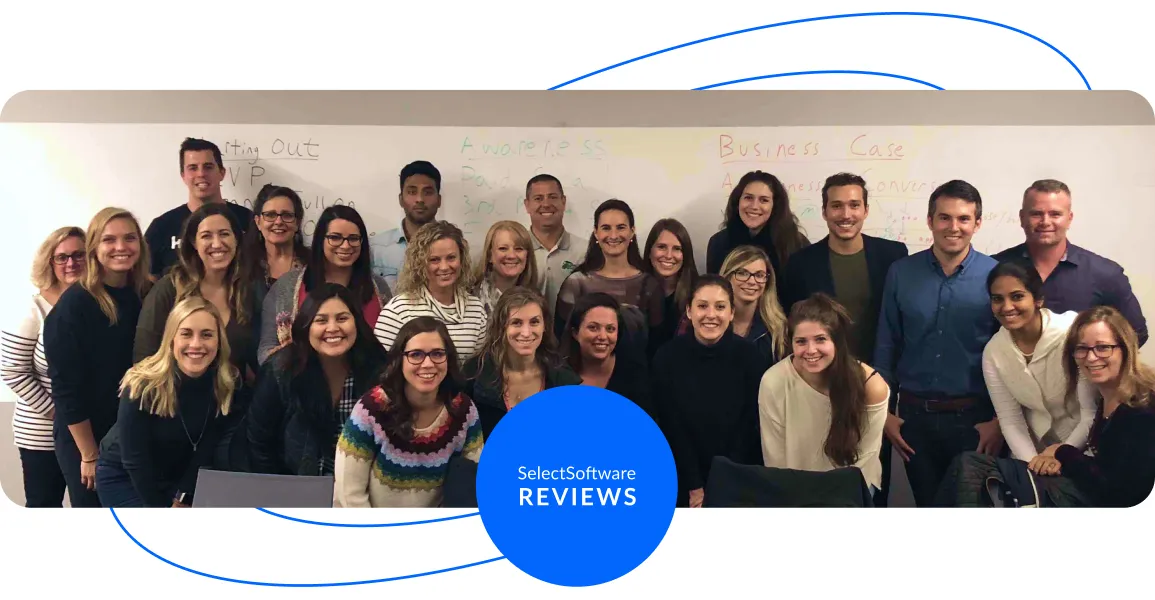
- Our goal at SSR is to help HR and recruiting teams to find and buy the right software for their needs.
- Our site is free to use as some vendors will pay us for web traffic.
- SSR lists all companies we feel are top vendors - not just those who pay us - in our comprehensive directories full of the advice needed to make the right purchase decision for your HR team.















